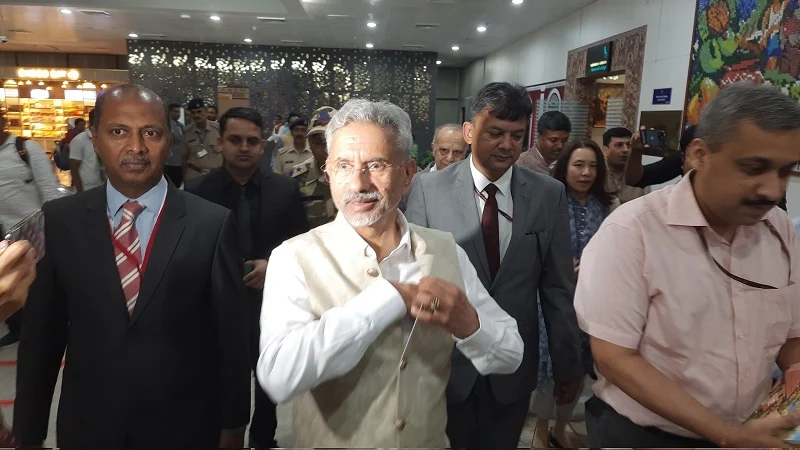

External Affairs Minister S. Jaishankar arrives in Goa ahead of the SCO conference
Calwaddo (Goa): In a world undergoing deep transition, India will engage with the eight-nation Shanghai Cooperation Organisation (SCO) foreign ministers to secure its interests in Eurasia, where China is the main challenger and pivotal states such as Iran and Russia are keen not to over-rely on Beijing.
For India, the key would be the bilateral meetings that will take place on the sidelines of the foreign ministers’ conference, hosted by External Affairs Minister S. Jaishankar. Meetings with Chinese foreign minister and state councillor Qin Gang are already slated. It may not come as a surprise if Jaishankar meets his Iranian counterpart Hossein Amirabdollahian on Thursday, three days after Monday’s day-long but highly significant visit to Tehran by National Security Advisor (NSA) Ajit Doval.
The much-hyped presence of Pakistani foreign minister Bilawal Bhutto-Zardari is likely to prove a damp squib. First of all, it is unlikely that a bilateral meeting between Zardari and Jaishankar will take place. Even if it does, India’s stand will be clear and terse. A full-blown revival of ties with Pakistan is only possible if Islamabad verifiably terminates the spread of terrorism in India. Till that happens, as a follow-up of the revived ceasefire agreement of 2021, the relationship between the two sides, from an Indian perspective, will remain in deep freeze.
With China, the conversation is essentially about restoring the status quo ante in Eastern Ladakh as it existed in April 2020. Unless Chinese troops withdraw from the friction points that resulted following the incursion of troops from the People’s Liberation Army (PLA) three years ago, a forward movement of ties will remain difficult. In the battle of wills that ensued three years ago, the Chinese have now arrived at a position that India should de-link the border incursion from the other tracks of the relationship, including economy, trade and investment. On the contrary, India has taken the position that it is impossible to separate the current incursion from the overall normalisation of ties. Nevertheless, the conversation could turn interesting to smoothen Chinese President Xi Ping’s visit for the SCO summit in New Delhi on July 4.
Jaishankar’s talks with his Russian counterpart Sergey Lavrov is expected to explore ideas that will smoothen the path of burgeoning India-Russia trade following the Ukraine war. India has been making bulk purchases of Russian oil, taking annual trade between the two to around $30 billion dollars. But payments through the rupee-rouble mechanism is yet to fructify. The two sides have also been discussing digital payments using the Mir and Rupay gateways. Russia is also keen that India steps up its investments in the Russian Far East, known for its large energy reserves including oil, gas, and coal. India and Russia are also exploring early activation of the sea route from Chennai to Vladivostok, the heart of the Russian Far East. The two are also likely to discuss the current status of the Ukraine war, and possible scenarios that may emerge in the future during their talks.
Talks with Iran, if they materialise, are likely to focus on deepening India’s foothold at the Chabahar port and improving the access to Afghanistan along the Chabahar route, including the role of a railway that will move northwards from Chabahar.
There are other geopolitical considerations that are at play as well. For instance, it is not in India’s interest that sanctions hit Iran inordinately deepens its relations with China, which has already expressed its keenness to invest billions of dollars in West Asia’s pivotal state. The Chinese footprint has also expanded after Beijing intervened to bring about a thaw in Iran-Saudi Arabia ties. India would therefore need to establish a strategic anchor of its own in Iran to dissuade Tehran from allowing China a permanent presence along its Indian Ocean coastline, as a supplement to its presence in Pakistan’s Gwadar port.
The foreign ministers’ meeting in Goa is taking place ahead of the G-7 summit in Hiroshima, where western nations are likely to exhort India to modify its position of neutrality on the Ukraine war. Before that happens, India may have an opportunity in Goa to fortify its stakes in Eurasia, which enables it to strike a better balance in its ties with the West.
Also Read: As SCO and BRICS members, how Saudi Arabia and Iran can change East-West balance of power
Union Minister of Ports, Shipping and Waterways, Sarbananda Sonowal, said on Monday that the number…
The inhabitants of Pakistan-occupied Jammu and Kashmir (PoJK) have been enduring years of neglect as…
The Defence Research and Development Organisation (DRDO) is set to make a significant impact at…
Cyprus President Nikos Christodoulides and Prime Minister Narendra Modi on Monday viewed the mountains near…
Cyprus President Nikos Christodoulides said he and Prime Minister Narendra Modi discussed expanding bilateral ties…
Prime Minister Narendra Modi said on Monday that India and Cyprus will develop a strong…